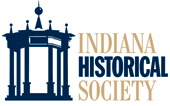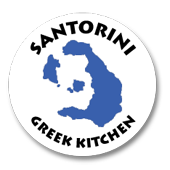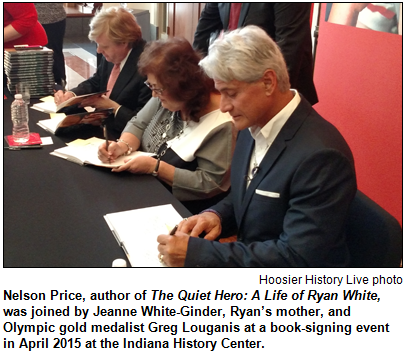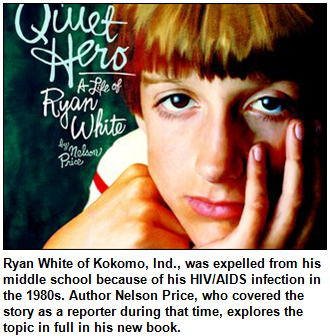Saturdays, noon to 1 p.m. ET on WICR 88.7 FM.
Or listen live from anywhere on WICR
Online!
April 4 show
Donald Davidson on Clark, Carnegie and more
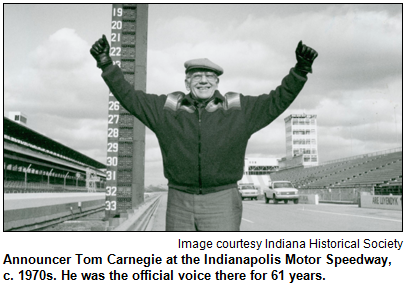 Fifty years ago, the Indianapolis 500 was won by one of the most popular drivers in history.
Fifty years ago, the Indianapolis 500 was won by one of the most popular drivers in history.
In fact, legendary broadcaster Tom Carnegie once confided to our host Nelson that Scotland native Jimmy Clark, who was killed during a race three years after his triumph in 1965 at the Indianapolis Motor Speedway, was one of his two favorite drivers.
To share insights about Clark, Carnegie and other aspects of the Speedway's colorful history, a "walking encyclopedia" will be our guest. Speedway historian Donald Davidson will join Nelson in studio.
A native of England who became obsessed with the Speedway as a boy overseas, Donald showed up at the race track in 1964 and instantly wowed Hoosiers with the depth of his 500 Mile Race trivia. In addition to Donald's arrival in 1964, Jimmy Clark (who had captured Rookie of the Year honors the previous year) was the leader at one point during the 500, although the race ultimately was won by A.J. Foyt.
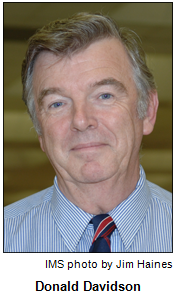 Also during the 1964 race, another popular driver, Eddie Sachs, was killed during a horrific seven-car accident. Sachs, by the way, was the other driver whom Tom Carnegie identified to Nelson as his all-time favorite.
Also during the 1964 race, another popular driver, Eddie Sachs, was killed during a horrific seven-car accident. Sachs, by the way, was the other driver whom Tom Carnegie identified to Nelson as his all-time favorite.
"He was a showman, just like me," Carnegie (referring to Sachs) told Nelson, whose profile of the "Voice of the 500" is the cover story of the current issue of Traces of Indiana and Midwestern History, the magazine published by the Indiana Historical Society.
Our guest Donald Davidson is quoted throughout the article about Carnegie, who died in February 2011. Beginning with his first gig as the track announcer for the Indy 500 in 1946, Carnegie, Nelson writes, "went on to announce an astonishing 61 Indianapolis 500s, 12 Brickyard 400 races and six U.S. Grand prix competitions, achieving a broadcasting version of a track record that probably will never be equaled."
Donald Davidson is equally treasured as a Speedway institution. He was a Hoosier History Live guest in March 2011 for a show about the 100th anniversary of the Indianapolis 500, which made its debut in 1911.
This time around, Donald will time-travel 50 years in reverse, to Jimmy Clark's spectacular victory in 1965 at the Indy 500. 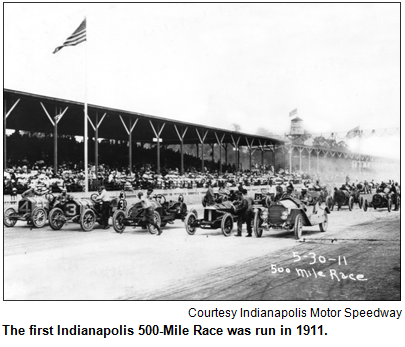 The Scotsman became the first foreign driver since 1916 to win the race, accelerating a "British invasion" that paved the way for subsequent successes by drivers such as Graham Hill and Jackie Stewart.
The Scotsman became the first foreign driver since 1916 to win the race, accelerating a "British invasion" that paved the way for subsequent successes by drivers such as Graham Hill and Jackie Stewart.
In Autocourse Official History of the Indianapolis 500 (CMG Publishing, 2006), which Donald co-wrote with Rick Shaffer, he describes Clark as "shy, polite, driven and adored by the American public." The 1965 race, which Clark led for 190 of the 200 laps, featured "as dominant a performance as ever seen at the Speedway."
Clark, a two-time Formula One champion, was 32 in 1968 when he was killed during a race in Germany.
His rookie year at the Speedway, 1964, also was notable for some famous guests who, four months after the race, stayed at the bygone Speedway Motel. The Beatles bunked there while in town for their legendary concerts at the Indiana State Fairgrounds.
During our show, Donald will share what he knows about the Beatles' visit to the racetrack. Donald reports he enjoyed a chat in 1964 about the Fab Four with Ed Sullivan, the host of the TV variety show that, earlier during the year, introduced the Beatles to the American public. Sullivan also visited the Speedway in 1964.
Any show with this Speedway historian extraordinaire - who has been inducted into the Auto Racing Hall of Fame - is an ideal opportunity for listeners to call and ask their most burning questions about racing history and folklore. Call in to the show at (317) 788-3314.
Learn more:
- Hoosier History Live, March 2011 interview with Donald Davidson.
- Indianapolis Motor Speedway, "In Memory of Tom Carnegie."
Roadtrip: 1864 interracial collaboration in Fletcher Place
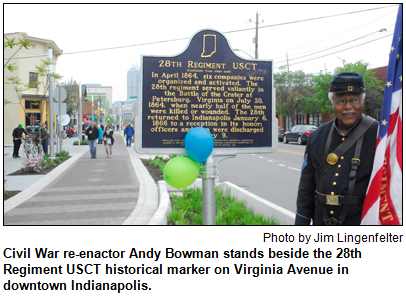 As Indiana continues to address the issue of diversity, Guest Roadtripper Georgia Cravey - a librarian, researcher and independent scholar - will tell us that an 1864 interracial collaboration helped to create the formation of the USCT 28th, the only African-American Civil War troops from Indiana. And two historical markers on Virginia Avenue in Indianapolis tell more of the story.
As Indiana continues to address the issue of diversity, Guest Roadtripper Georgia Cravey - a librarian, researcher and independent scholar - will tell us that an 1864 interracial collaboration helped to create the formation of the USCT 28th, the only African-American Civil War troops from Indiana. And two historical markers on Virginia Avenue in Indianapolis tell more of the story.
Georgia tells us: "Rev. Willis R. Revels, pastor of Bethel AME Church, and Calvin Fletcher, a powerful white local business leader and attorney, were critical to the organization of the USCT 28th. Together the two men convinced Gov. Oliver P. Morton to authorize the enlistment of black Hoosiers in the Union Army."
Revels served as a recruiting officer and as a surgeon for the regiment. Fletcher allowed troops to muster and train on a portion of his Virginia Avenue farm known as Woodlawn. The encampment was dubbed Camp Fremont, named for Gen. John C. Fremont. Details about life in the USCT 28th are available to us thanks to letters exchanged among members of the Trail family, who sent four sons to fight. The troops departed Indianapolis in April of 1864.
History buffs can take an easy stroll on the Virginia Avenue leg of the Indianapolis Cultural Trail in the historic Fletcher Place neighborhood and encounter two state historic markers that document this history. The marker that commemorates the USCT 28th stands at the intersection of McCarty Street and Virginia Avenue near the site of Camp Fremont.
Fletcher's marker stands at the intersection of Virginia Avenue, Fletcher Avenue and East Street.
"Opportunities for refreshments along this portion of the trail are plentiful," says Georgia, "but in keeping with the topic, I recommend a caffeinated beverage from Calvin Fletcher Coffee Shop, a nonprofit operation midway between the two historical markers. You can watch the passing scene on the Cultural Trail or contemplate the Kipp Normand installation in the windows while you sip your latte. The shop is a community gathering spot with an inclusive atmosphere that would make Calvin Fletcher proud."
History Mystery
 Tom Carnegie, the legendary sports broadcaster and track announcer at the Indianapolis Motor Speedway, once told Nelson, our host, that he noticed a transformation in Indy 500 drivers when one particular race driver showed up.
Tom Carnegie, the legendary sports broadcaster and track announcer at the Indianapolis Motor Speedway, once told Nelson, our host, that he noticed a transformation in Indy 500 drivers when one particular race driver showed up.
Unlike drivers of previous eras, whom Carnegie characterized as typically "a rough bunch," this driver had graduated from Brown University and was an accomplished engineer. A native of New Jersey, he competed in his first Indy 500 in 1969. Popular, well-spoken and handsome, he eventually was an Indy 500 champion. Tragically, he was killed in 1975 during practice for a Grand Prix race overseas.
Question: Who was the driver?
The call-in phone number is (317) 788-3314, and please do not try to win the prize if you have won any prize from WICR during the past two months. Please do not call in to the show until Nelson has posed the question on the air.
The prize pack is two tickets to the Indiana Wine Fair in Brown County on April 25, courtesy of Story Inn, and a pair of tickets to the Indiana State Museum, courtesy of the Indiana State Museum, and a Family 4 Pack to Conner Prairie Interactive History Park, courtesy of Conner Prairie.
Your Hoosier History Live! team,
Nelson Price, host and
creative director
Molly Head, producer, (317)
927-9101
Richard Sullivan, webmaster
and tech director
Pam Fraizer, graphic
designer
Garry Chilluffo, media+development director
Please tell our sponsors that you appreciate their support: Indiana Historical Society | Lucas Oil | Santorini Greek Kitchen | Society of Indiana Pioneers | Story Inn | Visit Indy

 Acknowledgments to Monomedia, Visit Indy, WICR-FM, Fraizer Designs, Heritage Photo & Research Services, Derrick Lowhorn and many other individuals and organizations. We are an independently produced program and are self-supporting through organizational sponsorships and individual contributions. We do not receive any government funding. Visit our website to learn how you can support us financially. Also, see our Twitter feed and our Facebook page for regular updates.
Acknowledgments to Monomedia, Visit Indy, WICR-FM, Fraizer Designs, Heritage Photo & Research Services, Derrick Lowhorn and many other individuals and organizations. We are an independently produced program and are self-supporting through organizational sponsorships and individual contributions. We do not receive any government funding. Visit our website to learn how you can support us financially. Also, see our Twitter feed and our Facebook page for regular updates.
Jam-packed event!
Hundreds attend book launch
|
With the launch of The Quiet Hero, A Life of Ryan White, author Nelson Price, the host of Hoosier History Live, is making a string of public appearances to promote the book.
The big book-launch event on April 1 at the Indiana Historical Society was a great success, with a full house of history fans there to buy books and get them signed by Nelson, along with Jeanne White-Ginder and Olympic diver Greg Louganis, who drew inspiration from Ryan White.
Hoosier History Live salutes our host for his continuing success as an author!
In the news:
- Fox 59 video interview with Nelson, White-Ginder and Louganis.
- WRTV-6 news video about Nelson's book and the signing event.
- Nuvo newsweekly - "New Ryan White biography emphasizes his coping skills."
Buy the book:
- The Quiet Hero, A Life of Ryan White - Hardcover. 151 pages. IHS Press. $17.95.
|
April 11 show
Morel mushrooms, ramps and other foraging foods
Not only do foodies salivate about morel mushrooms, those who forage for them across Indiana treasure the delicacies so much they often keep their locations top-secret.
At the dawn of peak morel hunting season, Hoosier History Live will delve into the sponge-like mushrooms, as well as other food that involves foraging. 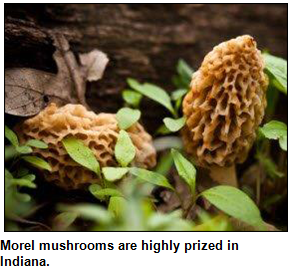 On this radio roadtrip (or woods excursion), we will explore the hunts for morels, an annual tradition undertaken by generations of families and friends.
On this radio roadtrip (or woods excursion), we will explore the hunts for morels, an annual tradition undertaken by generations of families and friends.
Our guests also will share insights about how to avoid the unpleasant (even poisonous) varieties of wild mushrooms; how to prepare morels, and just why on earth there is so much frenzy about them.
Nelson will be joined by two well-known experts in the central Indiana dining world:
- Becky Hostetter, chef and founder of Duos, which began its journey with food trucks and has expanded to include Duos Kitchen and Duos @ Eskenazi Health. Heralded for her vegetarian cuisine, Becky has led morel-hunting expeditions for decades.
- And food journalist Jolene Ketzenberger, who covers the landscape of the Hoosier culinary scene at EatDrinkIndy. Jolene has accompanied Hoosier chefs as they forage in the great outdoors, including hunts for edible flowers.
A front-page story last spring in The Indianapolis Star reported on some "morel maniacs" who faced criminal charges for trespassing on private property in Hamilton County. The rare mushrooms sometimes can be sold for $50 per pound.
With their distinctive, honeycomb-shaped tops, morels even have achieved their own celebratory festival in Indiana. The third annual Brown County Morel Festival will be April 23-25. Featuring guided hunts, mushroom auctions, classes, live music and crafts, the festival is based at Bill Monroe Music Park and Campgrounds.
In addition to morels, Nelson and his guests will explore ramps, which are wild leeks, and chanterelles, another type of mushroom cherished by foodies.
Learn more:
© 2015 Hoosier History Live! All rights reserved.
Hoosier History Live!
P.O. Box 44393
Indianapolis, IN 46244
(317) 927-9101




